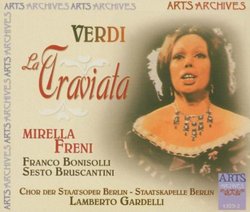| All Artists: Giuseppe Verdi, Lamberto Gardelli, Berliner Staatskapelle, Staatskapelle Berlin, Franco Bonisolli, Gudrun Schäfer, Hania Kovicz, Hans-Joachim Lukat, Heinz Rech, Mirella Freni, Peter Bindszus, Rudolf Jedlicka, Sesto Bruscantini Title: Verdi: La Traviata Members Wishing: 1 Total Copies: 0 Label: Arts Music Release Date: 7/27/2004 Genre: Classical Style: Opera & Classical Vocal Number of Discs: 2 SwapaCD Credits: 2 UPC: 600554303123 |
Search - Giuseppe Verdi, Lamberto Gardelli, Berliner Staatskapelle :: Verdi: La Traviata
 | Giuseppe Verdi, Lamberto Gardelli, Berliner Staatskapelle Verdi: La Traviata Genre: Classical |
Larger Image |
CD Details |
CD ReviewsBel Canto Bliss L. Lubin | NY, NY | 01/11/2005 (5 out of 5 stars) "[...] To any fan of Mirella Freni, this is a must have. While many divas whip out the first act fioriture with more brilliance, her gorgeously secure sound throughout the opera is second to none. Franco Bonisolli is an unjustly neglected tenor, notorious for onstage egomania, but scrupulously accurate to the score in the studio, with an anparalelled voice, high notes to spare (you won't hear his fabulous High C# or D in this opera, nor his unbelievable trill) with a baritonal depth right to the top. Sesto Bruscantitni suffered from versatility overkill: he could sing anything from lyric baritone to comic bass with equal ease, and his singing here is some of the most sensitive you'll ever hear in this role. The smaller parts are taken by top Berlin Opera house singers, which ain't too shabby. And Lamberto Gardelli's as idiomatic a Verdian as anyone could want. Over all, after the Callas-Giulini this is my favorite Traviata. Maybe not the most dazzling or incisive, but superbly sung, and sensitive to the last comma." Worth hearing and keeping !!! Michel | Montreal, Quebec | 04/07/2007 (4 out of 5 stars) "Mirella Freni's voice and temperament are certainly better suited to roles such as Mimi or Micaela than the complex Violetta - that said she is still worth hearing if only for the sheer loveliness of her sound and her sincerity - she sings extremely well throughout and negociates the coloratura of act I with ease if not brilliance. Franco Bonisolli is a young and attractive sounding Alfredo and blends beautifully with Freni. Sesto Bruscantini is a little dry of voice but sings well and is very credile as a father figure. Chorus and orchestra are excellent under Lamberto Gardelli's conducting and the sound is superb. Not a first choice but still a worthy version. " A believable and beautiful version of "Traviata" Ralph Moore | Bishop's Stortford, UK | 12/09/2008 (4 out of 5 stars) "Somehow, over the years, this 1973 recording made in Berlin for German TV has never shown up on my radar, despite my having long sought a really satisfying version of "La Traviata", but I am now very happy to have discovered it. I agree with the previous reviews; this is really a set to live with, as, despite no particular individuality in the interpretation, everything hangs together dramatically, all the singing is sensitive and often very beautiful, and there are none of the irritating flaws that mar other sets. The recording quality is clear, bright and full; the orchestral playing unobtrusively excellent; the conducting similarly restrained and respectful of the score - it all works.
This is a notoriously difficult opera to bring off satisfactorily in the recording studio. There are other sets with equal claims, but many give me heartburn either because of poor sound quality (all the Callas versions, being either live or featuring inadequate casting in the other two big roles) or because of insensitive conducting (Pretre, in the otherwise superbly sung set with Caballe and Bergonzi), poor singing (the wretched Nucci and the throaty Lopardo, who fail to match Gheorghiu's lovely Violetta for Solti) or simple miscasting (Milnes always sounding too young and virile for the role of Alfredo's father; Tucker singing wonderfully but sounding too old - and so on). It is true that, as Germont, Bruscantini has not the most refulgent tone, especially compared with baritones such Merrill and Milnes, but he is so experienced and really sounds like an elderly, concerned father without being at all quavery of voice - just a little dry of tone. He has a perfect sense of style, of course, and a lovely legato. Bonisolli sounds young, naive and impetuous (like the man himself, dare one observe?) and accompanies Freni beautifully. Freni is, as ever, highly accomplished, invariably tasteful, and sings with touching, limpid tone. Hers is an impeccably voiced Violetta; nothing is done for effect but all the notes are in place and a wholly credible character emerges. I part company with a previous reviewer concerning the calibre of the supporting cast: there are some pretty provincial voices there and some very Germanic Italian - but it matters little in face of the quality of three Italian principals, who really know their business. So this recording goes near to the top of the list. I still want to hear Callas, Moffo and Caballe but this Gardelli set is a safe recommendation to anyone wanting to become acquainted with this great work." |
